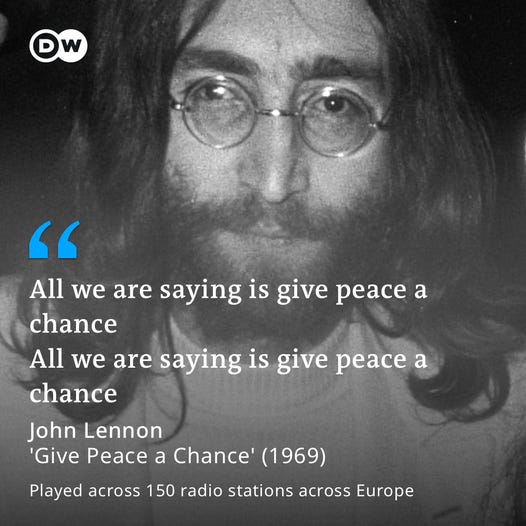Now I’ve been happy lately
Thinking about the good things to come
And I believe it could be
Something good has begun
— Cat Stevens, 1971
“Musings” of the sort that I’ve been sharing in my CultKW posts, in a ponderous but also a light, playful manner, are not well suited to dealing with the horrific turn of events in Ukraine. But ignoring the war, and carrying on as though nothing has happened doesn’t feel right either. So I’m going to give it a try.

Let’s start with Vladimir Putin singing “Blueberry Hill”. I came across a clip of Russia’s strong man singing Fats Domino’s global hit in front of a glitzy crowd thick with movie stars in a Guardian article. The occasion was a fundraiser for a children’s charity back in 2010, just before the turn towards the horrors currently unfolding in the Ukraine. The headline reads: “Putin’s Hollywood pals – the stars who snuggled up to the Russian dictator”.
I posted the link, agreeing that this is certainly an embarrassing moment for the glitterati involved. But I also noted that I found it strangely moving to hear that shaky voice performing a rock standard in the style of a nursery rhyme coming from the man who has become the new face of evil on this planet.
A dear friend, a Ukrainian-Canadian who was a regular at the Commons Studio, responded to my post with a plea: “My homeland … please pray for my home. We need a miracle.”
“We do need a miracle,” I answered. “At this point all I can see is mutually assured destruction. If the result is anything that can be interpreted as a victory for any one or combination of the parties involved — the Russian Federation; the Ukrainian state; the Ukrainian people; the Russian people; “the West”; the Free World, the rest of the world; NATO, the non-aligned, or any alignment of nations — if anyone wins, everyone will lose.”
I’m afraid my friend may have interpreted this as taking a neutral stance, and mitigating, if not justifying, the invasion of her homeland. That’s not the intention. Being surprised by Putin revealing his vulnerable side doesn’t lessen his crimes. On the contrary, it makes them worse. A monster comparable to a Hitler, a Stalin, or a Pol Pot would simply be acting according to character. A regular human being has no such excuse.
But the Blueberry Hill episode does make room for a tiny glimmer of hope that Putin and his kind may yet be reached. His mind, his culture and his nation are not as far from the ways of “the West” as we imagined Russians to be when they were still under Soviet rule.
There’s a lot of praying in social media. I’m not in the habit of petitioning the deity in the conventional way, hands clasped, head bowed, knees bent. But when it starts to look like only a miracle can deliver us from the kind of evil we see in Russia’s attack on Ukraine, prayer, or something like it, is an appropriate response. It may, in fact, be the only recourse we have left other than fighting to the bitter end.
Hopeful, faithful praying is an active response: You’re not just waiting for a miracle, you’re longing and pleading for deliverance, trusting that it is at least possible, “God willing,” as they say.
Hopeful, trusting imagining of what the best possible outcome — in other words, wishful thinking — can also a kind of activism. Miracles don’t descend from out of the blue to conjure a new reality into being among us creatures here below. Redemption usually involves taking the various elements that led to a situation like the one people in Ukraine are facing, and realigning them, in this case so that they can go on with their lives in peace, each in their own small corner, according to their own lights. And the best way to do that is with faith, hope and, above all, good will.
I’m too old to fight. I have no money to give. Nothing I can say will make a difference as the powers that be decide the fate of the Ukrainian people. Hopeful, trusting imagining how deliverance might come about is all I can do.
“My homeland … please pray for my home,” my friend implores. And that’s what I’m doing here: Praying for Ukraine, and for all of us, in the only way I know how.

I’m not a pacifist. I know full well that if it wasn’t for allied soldiers, most notably from Canada, my birth certificate would have had a swastika on it — if I’d been born at all.
My generation was conceived and raised in the new hope that came with the cessation of hostilities in 1945. We’re the children of the peace that came with military victory over Hitler and Mussolini. I like to imagine that as a result, we are naturally inclined towards giving peace a chance.

That’s why I found it encouraging to hear, via DW [Deutsche Welle] Music, that on Friday morning, March 4th, “around 150 public radio channels across Europe – including Ukraine – came together in a simultaneous broadcast of John Lennon’s anti-war song ‘Give Peace a Chance’. Over 25 countries participated in the initiative started by the German station radio EINS. The gesture was developed as a demonstration of how the power of radio can amplify growing support for peace.”
For the people of Ukraine, peace was never given a chance. Nothing can justify what Putin is doing. He is certainly the aggressor in this war. Ukraine is an internationally recognized sovereign nation, and a member of the United Nations. That makes the Russian dictator a war criminal.
That’s why he can’t be expected to see the light, change the course of his actions and give peace a chance. Ukraine has been left with no alternatives; it’s either surrender or fight for their very existence as a nation. So it’s really our move. It is cowardly to express sympathy and solidarity with Ukraine, but leave all the fighting, dying and suffering to them. It is also careless to leave all the negotiating to them. This is a fight between Russia and all of us in what we call the Free World.

Current NATO member states — wikipedia
The fact is, the Russians have been firm about opposing the extension of the North Atlantic alliance to their borders with Georgia and the Ukraine since we, meaning us here in “the West,” announced this intention in 2008. To give peace a chance, we could have started taking their concerns seriously and considering other options 14 years ago.
It is not hard to understand how the idea of “the West” or the “Free World” extending from Hawaii eastward, back across the Atlantic to encompass all of Europe, all of what once was “Christendom”, except the Russian Federation is considered a threat from a Moscow perspective
To give peace a chance, we could, for instance, urge Ukraine to join Finland, Sweden, Austria and Ireland as a non-aligned nation, and guarantee that we will respect this neutrality. And we could express an openness that the Russian Federation itself join the circle of European security, thereby turning NATO into a North Atlantic to Pacific Treaty Organization.
A United North from the Atlantic to the Pacific, and from there full circle to the Atlantic again is not impossible to imagine. Russia is the only missing link.
A truly United Europe wouldn’t guarantee a lasting peace. For one thing, such a development would likely be an affront to China, and could lead to a stand off with a power much more formidable than the hapless Russian state. So I’m wishfully suggesting that at the same time, we — in this case, Canada — propose a North to South Treaty Organization that connects Russia, China, Iran, Pakistan, India and area.
Just imagining something along such lines could be a significant step towards giving peace a sliver of a chance, not just in Ukraine, but throughout the whole world for a generation or two or three.
John Lennon, Yoko Ono and company singing “all we are saying is give peace a chance” in that Montreal hotel 53 years ago remains relevant as a plea to humanity, and, I’m suggesting, as a hopeful, faithful prayer. Faithful, at least, to the promise of the angel chorus in Bethlehem: “peace on earth, good will to mankind.”
The same goes for George Harrison singing “Give Me Love (Give Me Peace on Earth)” in 1973; or Donovan performing Buffy Sainte-Marie’s “Universal Soldier”, and Edwin Starr declaring “War, What’’s it good for? Absolutely nothing.” These examples are all subjects of recent posts from Deutsche Welle Music.
Some current statements and gestures from the world of Western entertainment are expressions of solidarity, not just with the plight of the people of Ukraine, but in their fight for national self-determination. Justifiably so; they need and deserve our support, not just our sympathy. But this also signifies abandoning the idea of giving peace a chance, other than the peace that comes with victory for our side, and vanquishing the enemy.
It is highly doubtful that a crushing defeat of the military forces fighting on behalf of the 150,000,000 people in a nation state that encompasses 11% of the earth’s landmass will prove to be a step towards lasting peace. This would put Russia into the position we left Germany in just over a century ago. A likely result will be an Asian Axis like I described earlier, but without Canada, Australia or any other part of the West, thus setting the stage for an Armageddon scale conflict.
So is there any chance whatsoever for peace at this point — a just peace, immediately achieved, that involves neither victory nor surrender?
I’m proposing we try to imagine a way out, and suggesting that perhaps this amazing rendition of “Blueberry Hill” by a ruthless war monger more than a decade ago may be a place to begin.
To be continued … .
